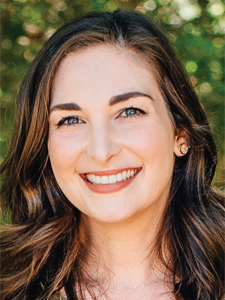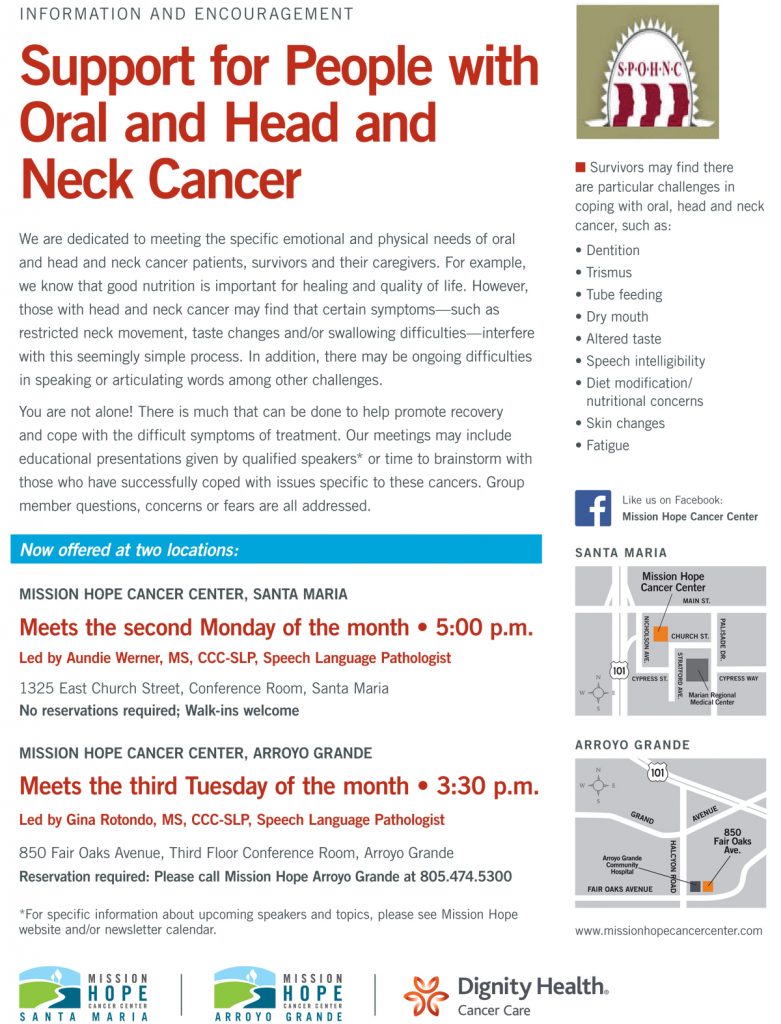How Do Speech-Language Pathologists Support Cancer Patients?
For Assistance, Call:
Marian Health & Wellness Center | Santa Maria | 805-739-3185
Gina Rotondo, MS, CCC-SLP | Arroyo Grande | 805-473-7639
Question: What are speech-language pathologists and how do they support cancer patients?
It is estimated that about 100,000 people will be diagnosed with a head, neck or thyroid cancer this year.
Although this does not grab headlines as often as many other cancers, for those affected the disease and treatment can have a significant impact on their lives. In general, most people survive head and neck cancer; however, side effects of treatment can sometimes be a long-term problem.
- The support and guidance of a speech-language pathologist (SLP) can do much to help promote recovery and cope with the difficult symptoms of treatment. Ideally, the SLP becomes involved when the patient has been identified as having head and neck cancer before their surgery or before their chemotherapy/radiation protocol.
- Counseling and education are provided as to the functions of voice, speech and swallowing. Assessment is made to determine the patient’s baseline and to provide guidance as to the patient’s role in their rehabilitation.
- Frequently, the SLP works with patients who have difficulty eating and drinking. Treatment is based on the cause of the problem: anatomical changes from surgery, decreased saliva, changes in taste, difficulty opening the mouth due to trismus, and problems protecting the airway, which can result in coughing and choking during meals.
- Maintaining nutrition after surgery and during treatment is necessary to help the body heal. At times, the patient may need to have a feeding tube to help with nutrition when it becomes too difficult to swallow.
- The SLP assesses the patient’s current needs, instructs the patient in specific swallowing exercises, compensatory swallowing strategies or diet modification recommendations.
- The goal is for patients to continue to eat and drink during and after treatment.
- Following radiation therapy, patients may experience lymphedema and/or fibrosis of the radiated tissue. These effects can persist long after the treatment concludes.
- Difficulties can include problems opening the mouth to eat from a spoon or fork, or decreased ability of the throat muscles to protect the airway while eating or drinking. In these cases, specific testing and exercises are instructed by the SLP.
- Voice changes may also occur after surgery or radiation. The SLP instructs patients how to use their voice efficiently so as not to strain the muscles. Patients who have had their voice box removed are instructed in alternative methods to produce voicing to communicate.
- Additionally, articulation and resonance changes can occur from surgery and/or radiation. Patients who have had sinus, palatal, jaw or tongue cancer are instructed how to articulate more clearly through customized treatment or prosthetic devices, if needed.
Each patient’s cancer is unique, as is the plan of care developed by the SLP. Mission Hope has excellent speech-language pathologists who are trained to provide their expertise to facilitate your road to recovery.

Gina Rotondo, MS, CCC-SLP
SPEECH LANGUAGE PATHOLOGIST
Gina Rotondo, MS, is a full-time speech language pathologist at Arroyo Grande Community Hospital Outpatient Rehabilitation. Originally from the Central Valley, Gina obtained a multiple subject teaching credential at CSU Fresno before realizing her heart wasn’t in the classroom. After shadowing a friend completing clinical work in speech language pathology, it was then Gina realized she wanted to make a greater impact in a medical setting with adults. She completed her Masters of Science in Speech Language Pathology at University of the Pacific in Stockton and moved to the Central Coast for work. Gina has practiced in private outpatient, home health, acute inpatient, skilled nursing facilities, and acute rehab settings prior to AGCH Outpatient Rehabilitation. She currently resides in Grover Beach with her husband and young daughter.

Mia Leeper, MS, CCC-SLP
SPEECH LANGUAGE PATHOLOGIST
Mia Leeper is a Speech Language Pathologist and Central Coast native. She received her Master’s degree in Speech-Language Pathology from the University of Tulsa in Oklahoma. Mia has worked with head and neck cancer patients across acute care, skilled nursing, home health, and outpatient settings. She currently works at Marian Regional Medical Center and Marian Extended Care Center. She is also a certified yoga instructor and a believer in the benefits of mind-body awareness. Mia enjoys the outdoors and lives in the Five Cities with her husband, 4-month-old son, three cats, and a dog. She looks forward to getting to know the Santa Maria SPOHNC group!

